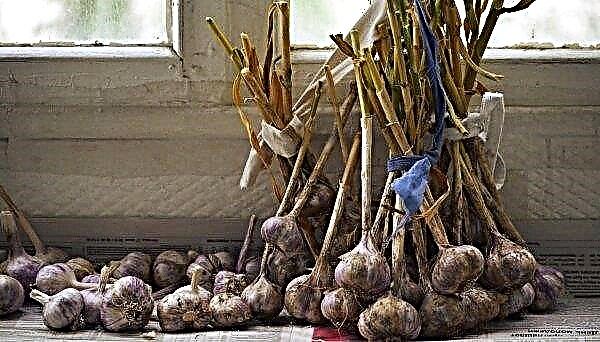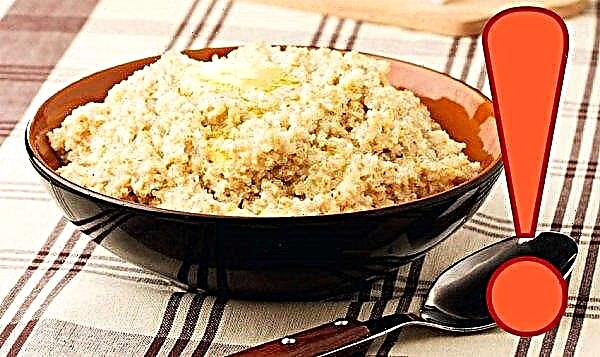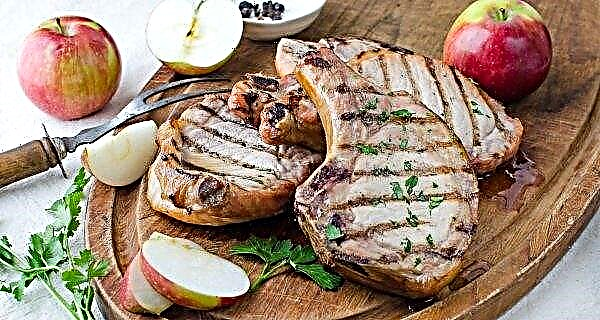Melon is a tasty and extremely healthy product. Most often, such a delicacy completes lunch or dinner, but in the morning it is somehow not accepted to use it. About whether it is possible to eat melon on an empty stomach and what dangers, real or mythical, are associated with this, is described in this review.
Botanical Description
Melon is an annual herbaceous plant of the Pumpkin family. Latin name - Cucumis melo. The stem can reach a length of 3 m, branch up to three levels and attach to the ground with the help of a mustache located in the leaf sinuses. The roots are superficial, the main stem goes into the ground for 2-3 meters, the side branches diverge at the same distance to the sides of the base of the bush.
Petiole leaves are arranged alternately, have pronounced pubescence and impressive dimensions, and the width of the leaf plate is usually greater than the length (12–28 cm and 7–20 cm, respectively). The shape of the sheets, depending on the variety, can be solid, lobed or heart-like. In the middle lane, melon begins to bloom in mid-summer. The plant forms three types of flowers - male, female and bisexual (hermaphroditic), pollination is carried out in a cross-sectional way. The flowers, regardless of species, are yellow and very large, however, male flowers bloom first and are grouped into inflorescences, while female flowers are solitary.
In the middle lane, melon begins to bloom in mid-summer. The plant forms three types of flowers - male, female and bisexual (hermaphroditic), pollination is carried out in a cross-sectional way. The flowers, regardless of species, are yellow and very large, however, male flowers bloom first and are grouped into inflorescences, while female flowers are solitary.
Fruit - pumpkin, large, round, elongated or flattened; depending on the variety and method of formation, the mass can range from 500 g to 20 kg. The skin color is yellow, greenish or light brown, the flesh is pale yellow, juicy and, as a rule, very fragrant. Numerous whitish seeds of oblong shape with a narrow nose are located in the central chamber of the fetus. The period of full ripening may occur 2-4 months after planting.
Did you know? With classification fetus melons certain difficulties arise not only among the inhabitants, but also among specialists. So, being the closest relative of the cucumber, it has every reason to be considered a vegetable, based on the sugar content in its pulp - a fruit, and judging by the botanical structure - even a berry.
Chemical composition
Calorie melon averages 34 kcal per 100 g (the indicator may vary depending on the variety of culture).
BZHU are distributed as follows:
- proteins - 9.7%;
- fats - 5%;
- carbohydrates - 85.3%.
However, both useful and hazardous properties of a product are determined not only and not so much by its calorific value and energy value, but by the specific chemical composition.
So, you need to know about melon that it is the source of the following biologically active substances:
- Vitamins: Vitamin A in the form of retinol and beta-carotene, ascorbic acid, thiamine, riboflavin, pantothenic acid, pyridoxine, folic acid, niacin, menaquinone, choline.
- Micro and macro elements: potassium, calcium, magnesium, sodium, phosphorus, iron, manganese, copper, selenium, zinc, iodine.
- Essential Amino Acids: asparagine, glutamine, glycine, tyrosine, serine, proline.
- Essential Amino Acids: valine, histidine, lysine, leucine, isoleucine, threonine, phenylalanine, phenylalanine-tyrosine, methionine-cysteine.
- Complex carbohydrates: pectins (fiber), hemicellulose, starch.
- Simple carbohydrates: fructose, sucrose, glucose, galactose.
- Saturated Fatty Acids: palmitic, stearic.
- Polyunsaturated Fatty Acids: linoleic, linolenic.
Did you know? In terms of iron content, melon is 17 times ahead of cow's milk, vitamin A in the product is 4 times more than in tomatoes, and vitamin C is 2 times more than in pineapple.
What is the use of melon on an empty stomach
As can be seen from the chemical composition of the melon, the beneficial properties of this product are numerous and varied. Moreover, according to nutritionists, they manifest themselves only if they use sweet flesh on an empty stomach, or at least in between meals of any other food, and the duration of such a break should be at least two hours before and two hours after. This peculiarity of the melon is explained primarily by its self-sufficiency and the huge amount of substances contained in it, which, due to their high biological activity, reacting with the nutrients that make up other products, are neutralized or, conversely, enhance or change their properties, and in both cases, such transformations can have completely unpredictable consequences.
This peculiarity of the melon is explained primarily by its self-sufficiency and the huge amount of substances contained in it, which, due to their high biological activity, reacting with the nutrients that make up other products, are neutralized or, conversely, enhance or change their properties, and in both cases, such transformations can have completely unpredictable consequences.
- Subject to the indicated rule, the melon has the following properties:
- increase hemoglobin in the blood (due to the high iron content);
- have antimicrobial and antifungal effects on the body;
- remove bad cholesterol from the blood;
- strengthen the walls of blood vessels and increase their elasticity;
- improve mood, increase vigor, bring out depression and spleen (the amino acids that make up the product activate the synthesis of serotonin, also known as the “hormone of happiness”);
- stimulate the protective functions of the body;
- to bind free radicals, promote cell regeneration and general rejuvenation;
- activate the production of bile and gastric juice;
- prevent blood clots;
- establish the work of the genitourinary and excretory systems;
- strengthen memory, help concentration.
Important! 100 g of melon of the popular variety “Kolkhoznitsa” corresponds to one bread unit, that is, it leads to an increase in blood sugar by about 1.5–2 millimoles per liter. And the glycemic index of the fruit ranges from 60–65.
Exclusively on an empty stomach, melon must be eaten by those who wish:
- establish the intestines, get rid of constipation (laxative properties of the fruit work most safely if you use the product on an empty stomach);
- get rid of extra pounds and fatty deposits on the stomach and hips;
- get rid of helminths without resorting to the help of potent chemicals (a glass of melon juice, drunk in the morning before meals, has a strong anthelmintic effect).
Contraindications and harm
There are not so many direct contraindications for a melon, including one eaten on an empty stomach. These include only the presence of individual intolerance (an allergic reaction to one or more of the components that make up the product), as well as diseases of the gastrointestinal tract (gastritis, ulcer, pancreatitis, etc.) in the acute stage. Other conditions in which melon should be used with caution are not absolute contraindications. So, a controversial and controversial issue is the compatibility of the product with diabetes. Of course, there is a lot of sugar in the melon, but for the most part it is presented in the form of fructose, the processing of which requires not too much insulin.
Other conditions in which melon should be used with caution are not absolute contraindications. So, a controversial and controversial issue is the compatibility of the product with diabetes. Of course, there is a lot of sugar in the melon, but for the most part it is presented in the form of fructose, the processing of which requires not too much insulin.
Without going further into the figures, it should be said that melon for diabetes can be eaten, but in very limited quantities, while giving preference to incompletely ripened fruits or varieties containing a minimum amount of sugar.
It should also be noted that there is a related plant from the Pumpkin family, the so-called bitter melon or “momordica” (Momordica charantia), which is used by traditional medicine to treat diabetes. However, there is no scientific confirmation of the effectiveness of such a “medicine” today.
Important! The list of products that are not compatible with breastfeeding is actually much shorter than is commonly believed. According to the official position of the World Health Organization, it certainly includes only alcohol, narcotic substances, as well as various synthetic dyes, stabilizers, flavorings, preservatives and other chemical additives used by unscrupulous manufacturers.
Another frequently mentioned restriction regarding the use of sweet and aromatic treats on an empty stomach is the period of pregnancy and lactation. However, it is worth noting that this warning does not have a direct connection with reality. For a future mother, melon is a real storehouse of vitamins, minerals and other biologically active substances critical for carrying a baby, and this need after childbirth, during breastfeeding, persists, and sometimes even rises.
As for the possible disruption of digestion in the baby due to the use of melon by the mother, as well as other juicy fruits and berries, there is really no direct connection between these two events.
The nutrients contained in the melon pass into breast milk in a form that is absolutely safe for the baby, therefore, restrictions on the use of this product may concern only the potential danger that a fruit with a pronounced laxative effect can carry the condition of the woman herself.
When not to eat melon
Speaking about why it is impossible to eat melon on an empty stomach, some authors explain that this product allegedly quickly "spoils" in the stomach, causing poisoning - nausea, vomiting, diarrhea, etc. It is clear that fresh and high-quality food, once in the stomach can't spoil there. However, certain situations in which it is better to refuse a sweet fruit or to postpone its use for a more suitable time still exist.
Regardless of the state of health and other subjective factors, you should not eat melon:
- Before the onset of its ripening season in this climate zone. Today, gourds begin to appear on the shelves in early summer, and sometimes are present all year round. Meanwhile, for proper ripening, a culture needs a certain number of sunny days (this indicator has the scientific name “the sum of active temperatures”). Early ripeness, and to be more precise, its visibility, is created through the use of various stabilizers, mainly nitrogen fertilizers, when growing plants. These substances (nitrates) accumulate in the pulp and can cause serious allergic reactions, poisoning and other dangerous consequences.
- As a dessert after a hearty lunch. The main processes associated with the digestion of melons occur in the intestine, and in the normal state, this process should be carried out very quickly. Lingering in the digestive tract in the “line” for other foods, the melon inevitably causes a feeling of heaviness, heartburn, bloating, flatulence and other unpleasant symptoms.
- Together, shortly before or shortly after eating foods containing large amounts of starch, alcoholic or carbonated drinks, milk and dairy products. A large amount of liquid also does not mix well with melon, which is more than 90% water.
- Children before they reach the age of two. The laxative properties of melons can be dangerous for the baby’s fragile intestines. For older children, the product should be introduced into the diet gradually and dosed; a single serving should not exceed 100 g.
- In large quantities. Reasonableness and a sense of proportion are rules that you must always remember when drawing up your diet, otherwise even the most useful product can become a real poison.
 Melon on an empty stomach is safe and very useful if you eat it in small quantities and listen to the signals sent by the body in response to refreshments. Strictly speaking, this is the only way, separate from other products, and you need to eat this delicious fruit in order to make full use of all the valuable properties that it possesses.
Melon on an empty stomach is safe and very useful if you eat it in small quantities and listen to the signals sent by the body in response to refreshments. Strictly speaking, this is the only way, separate from other products, and you need to eat this delicious fruit in order to make full use of all the valuable properties that it possesses.












